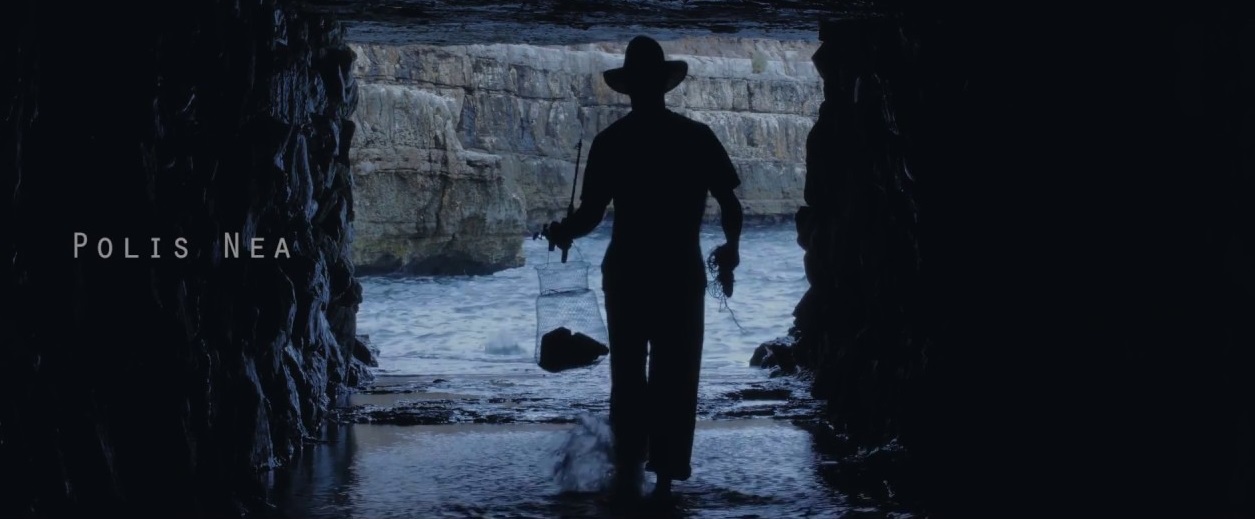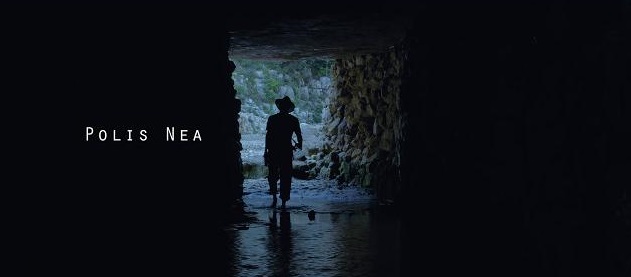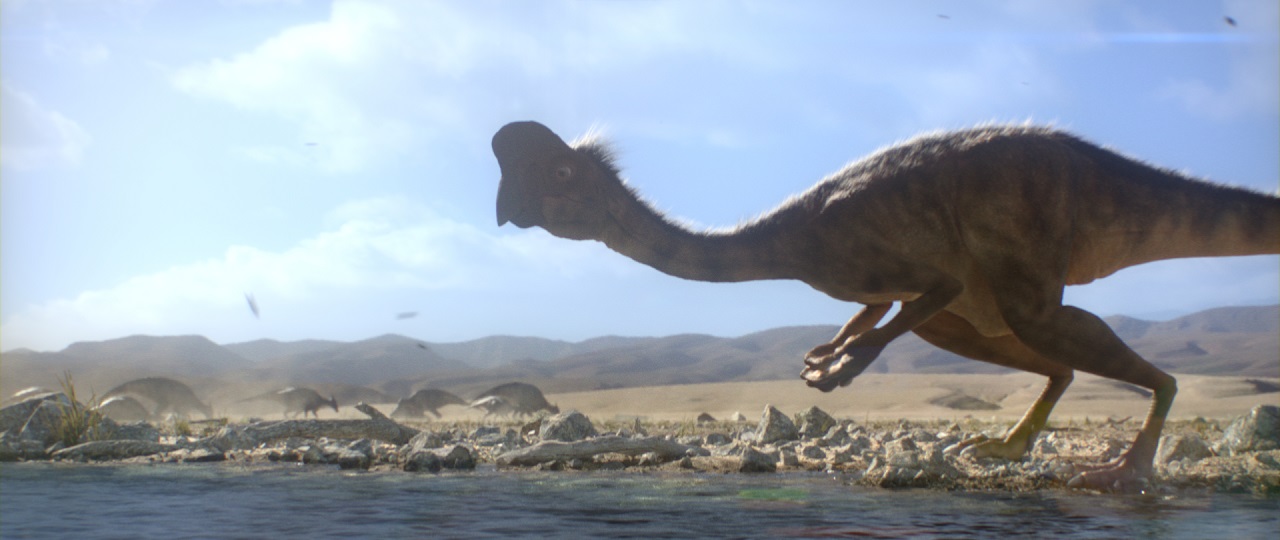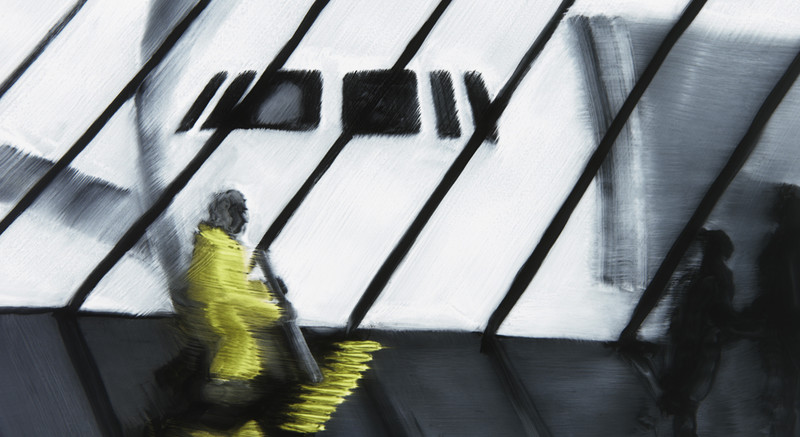#PFF17 • Polis Nea
Per quest’edizione, Birdmen è media-partner del Pentedattilo film Festival, il festival internazionale di cortometraggi che si svolge a Pentedattilo (Reggio Calabria) dal 7 all’11 dicembre. Ecco le nostre recensioni in anteprima. La Redazione, inoltre, assegnerà il Premio speciale Birdmen al miglior cortometraggio d’animazione e al miglior cortometraggio live action.
____________________
Nel 2037 la città pugliese di Polignano a Mare è stata completamente “colonizzata” dagli inglesi, che, attratti dalle tradizioni locali e dalla bellezza della natura, ne hanno fatto un luogo di residenza avveniristico. Lo stesso nome è stato adattato alla pronuncia anglofona, trasformandosi in Polineano. È in questo contesto che Pierluigi Ferrandini fa muovere i suoi protagonisti: un anziano, chiamato Vitino, originario del luogo ma affetto da Alzheimer, e il piccolo nipote di questo. Il bambino segue il vecchio nel tentativo di ritorno verso casa, verso il “luogo dell’anima”, e questo comporta il confronto che una realtà e una cultura, quella anglosassone, diversa dalla propria, che riesce ad amare in maniera sincera e totale le coste pugliesi.
 Ferrandini, in maniera sottile ma costante, mette in scena sostanzialmente una protesta verso coloro che non riescono ad apprezzare la bellezza che li circonda. Vari sono gli espedienti in cui questa critica prende corpo e primo tra tutti è certamente la rappresentazione dei giovani bambini inglesi a scuola, che studiano il territorio, e di un inglese che si dedica alla pesca per lavoro. Il rischio che si corre snobbando le qualità intrinseche del nostro territorio, sembra volerci dire il regista, è quello di svendere ciò che diamo per scontato, consegnandolo ad altri e perdendone, di fatto, il controllo. Significativo, a questo proposito, pare essere la figura del padre del giovane bambino pugliese, che, dietro ad un ostentato disprezzo verso gli “invasori”, sembra nascondere rimorso, rendendosi conto di ciò che ha perso.
Ferrandini, in maniera sottile ma costante, mette in scena sostanzialmente una protesta verso coloro che non riescono ad apprezzare la bellezza che li circonda. Vari sono gli espedienti in cui questa critica prende corpo e primo tra tutti è certamente la rappresentazione dei giovani bambini inglesi a scuola, che studiano il territorio, e di un inglese che si dedica alla pesca per lavoro. Il rischio che si corre snobbando le qualità intrinseche del nostro territorio, sembra volerci dire il regista, è quello di svendere ciò che diamo per scontato, consegnandolo ad altri e perdendone, di fatto, il controllo. Significativo, a questo proposito, pare essere la figura del padre del giovane bambino pugliese, che, dietro ad un ostentato disprezzo verso gli “invasori”, sembra nascondere rimorso, rendendosi conto di ciò che ha perso.
La fotografia aiuta certamente a mettere in risalto quanto appena detto. La macchina da presa illumina i vicoli e i muri fatti di rocce di una Polignano curata e dotata di ogni comfort tecnologico, ma che comunque conserva il suo volto tradizionale. Nondimeno, dà anche spazio allo stridente contrasto che si instaura con la scenografia periferica in cui vive Vitino, invasa da fabbriche e fumi.
Unico punto rivedibile del cortometraggio è forse il meccanismo narrativo, che, nel finale si blocca leggermente. Dopo averci fatto vedere, anche mediante l’uso di flashback, il ritorno del vecchio verso un luogo caro, la storia si risolve in maniera un po’ violenta, lasciando il nipote di Vitino (e anche lo spettatore) incerto sulle cause che hanno animato la partenza del nonno. Questo dubbio è risolto solo per mezzo di allusioni – uso del dialetto e primi piani, sottolineati da una musica dal sapore mediterraneo, che svelano le emozioni dietro alle espressioni dei personaggi – ma, vista la natura, a mio parere, di denuncia dell’opera, forse sarebbe stato meglio togliere ogni perplessità a riguardo.
Resta, ciononostante, un’opera valida, che, già dall’uso del nome originale della città (Polis Nea) come titolo, fa riflettere, con gentilezza e talvolta con ironia, sull’importanza delle nostre origini e sulla bellezza della penisola italiana.
____________________
For this edition, Birdmen is the media-partner of the Pentedattilo film Festival, the international short-film festival that will take place in Pentedattilo (Reggio Calabria) from 7th to 11th of December. Here is a preview of our reviews. Furthermore, we will assign a special Birdmen award to the best animation short-film and to the best live action short-film.
____________________
In 2037, the Apulian town of Polignano a Mare has been completely “colonized” by British, who, attracted by local traditions and the beauty of nature, have made it a futuristic place of residence. The very same name was adapted to the English pronunciation, becoming Polineano. It is in this context that Pierluigi Ferrandini moves his characters: an elder, called Vitino, an indigenous suffering from Alzheimer’s, and his little grandson. The child follows the old man to return home, towards the “place of the soul,” and this implies a confrontation with a reality and a culture, the Anglo-Saxon, different from his own, who succeeds in loving in a sincere and total way Puglia coasts.
Ferrandini, in a subtle yet steady manner, essentially staged a protest against those who cannot appreciate the beauty around them. There are various gimmicks in which this criticism takes shape and the first is certainly the representation of young British children at school, studying the territory, and an Englishman who is engaged in fishing for work. The risk that lies in snubbing the intrinsic qualities of our territory, this seems to say the director, is to sell out of what we take for granted, delivering it to others and, in effect, losing control. Significant, in this regard, is the figure of the father of the child, who, behind an ostentatious contempt for the “invaders”, seems to hide remorse, realizing what he has lost.
Photography certainly highlights what has just been exposed. The camera illuminates alleys and walls made of rocks of a Polignano curated and equipped with every technological comfort, but still preserves its traditional face. Nevertheless, it also paves way fot the strident contrast that is created with the peripheral scenery in which Vitino lives, flooded with factories and smoke.
The only criticism that we may appoint is perhaps the narrative mechanism, which, in the finale, is slightly blocked. After making us see, even by flashbacks, the old man’s return to a loved place, the story is closed violently, leaving Vitino’s nephew (and even the spectator) uncertain about the causes that animated the grandfather’s departure. This doubt is solved only by means of allusions – use of dialect and close-ups, underlined by a Mediterranean music that reveals the emotions behind the expressions of the characters – but, given the nature, in my opinion, of denunciation of the short, perhaps it would have been better to take away every perplexity about it.
Still we’re talking of a valid work that, starting from the use of the original name of the city (Polis Nea) as a title, inspires a reflection, with kindness and sometimes with irony, on the importance of our origins and the beauty of the italian peninsula.
____________________
#PFF17





